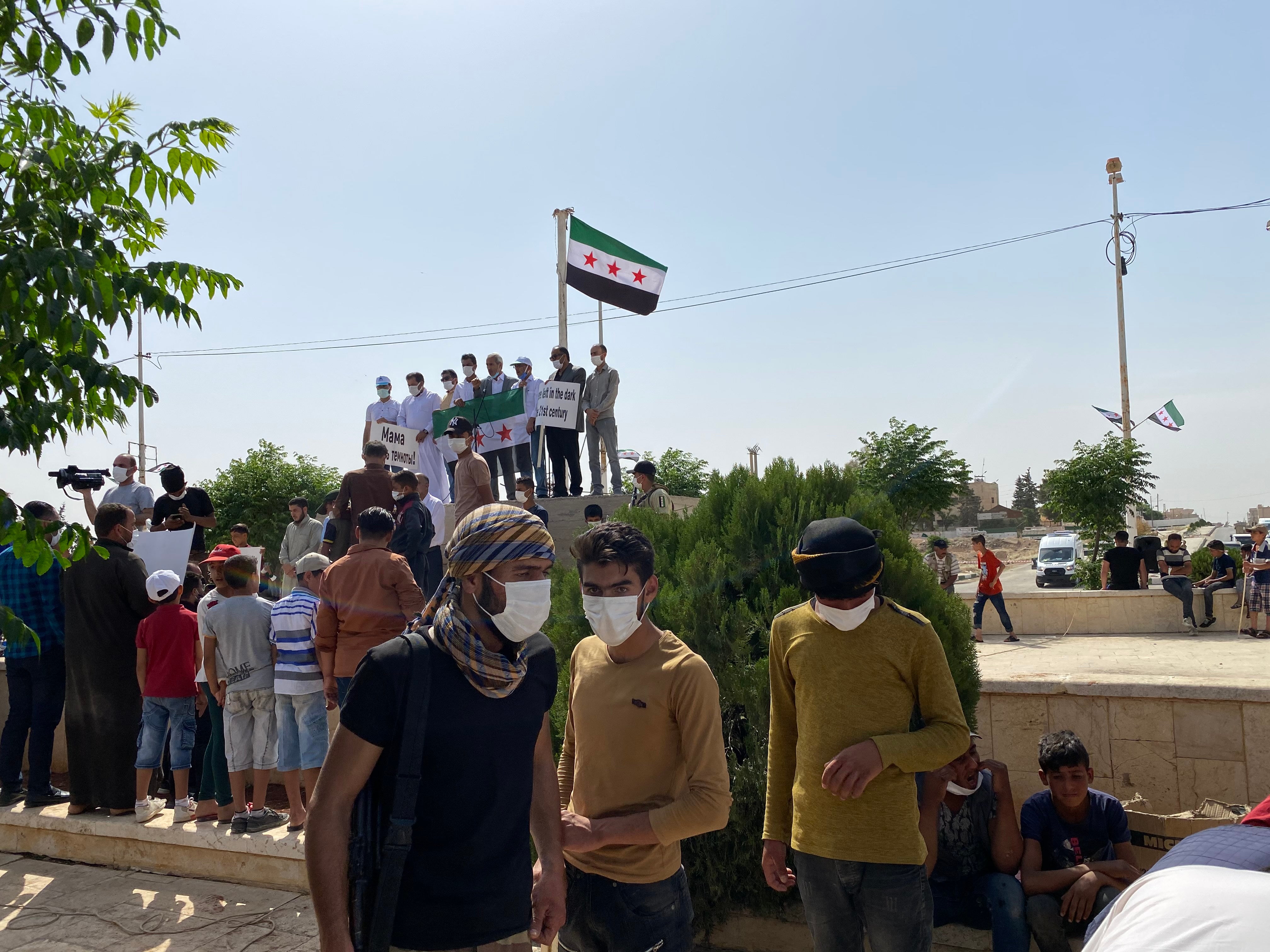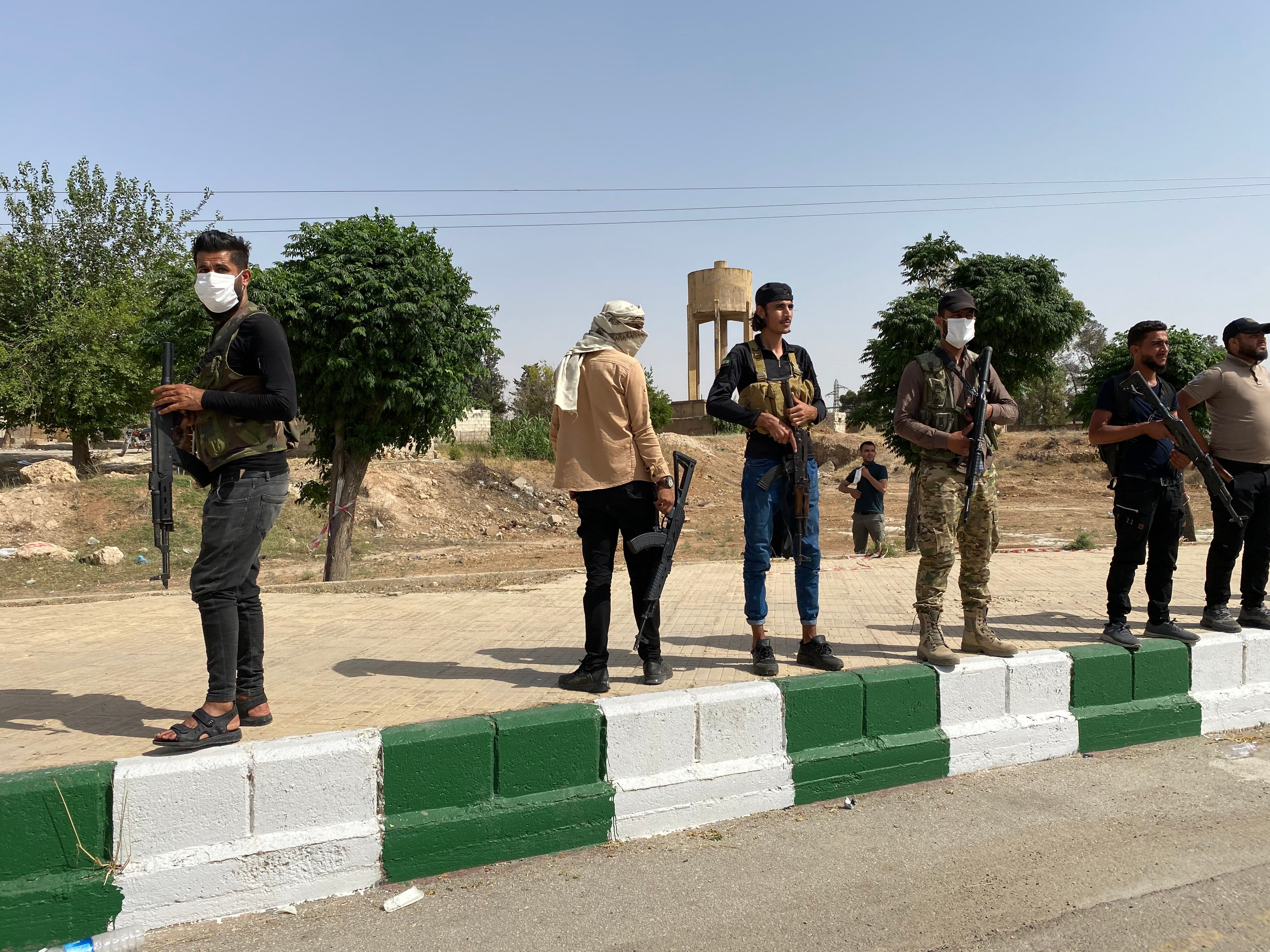Water shortage adds to bubbling tensions between Turkey and Kurds in northeast Syria
Borzou Daragahi reports from Tal Abyad, Syria, where a battle over natural resources could provoke further conflict


No electricity means no air conditioning or refrigeration, no television, no radio, no videogames, no lights at night.
But a lack of electricity that has stretched for months also means no running water in this dusty, parched northern Syrian pocket, just as scorching late-spring temperatures herald the beginning of the sweltering summer.
That has exacerbated ongoing geopolitical tensions between the Turkish government, the Kurdish-led authorities and the Syrian regime, prompting concerns of another outbreak of armed conflict in the region.
“There’s no electricity for months now,” says Mohammed al-Abou, a police officer serving in the Turkish-backed forces providing security in the town, under a scorching sun. “We are reaching the edge of our patience.”
The dispute over scarce resources shows the explosive dynamics underlying months of relative calm in northern Syria, where local political and military units backed by Turkey jostle up against Kurdish-led armed groups, as well as Iranian and Russian-backed forces aligned with the regime in Damascus. Meanwhile Isis remnants continue to maintain a presence to the east.
Turkish military authorities and their Syrian allies recently invited a small group of journalists into Tal Abyad to attend a protest by Syrians demanding military action against the Kurdish forces controlling the dam which has in the past provided the area with power for the water pumps.
Turkey seized control of Tal Abyad in 2019 from the Kurdish-led forces of the Democratic Union Party (PYD), a Kurdish-led force affiliated with the Kurdistan Workers Party (PKK), the outlawed militant group which has been fighting the Ankara government for decades.
But Kurds continue to hold onto the strategic Manbij district to the west, where the key Tishrin Dam is located and generates up to 600 megawatts of power. Local authorities say the Kurds have switched off the 25 megawatts of power from the dam 50 miles away that is the normal allotment for Tal Abyad and Ras al-Ain, another Syrian city under Turkish dominion.
Because water from the Euphrates River is no longer pumped to the area, towns of Hasaka province rely on well water drawn out by electric-powered pumps.
“If we have electricity, we can operate the pumps,” says Abdullah Al-Lai, chief of water projects for Tal Abyad. “If we have pumps, we can have water.”
Locals suspect the Kurdish-led forces cut off power to stoke local anger and unrest in the Turkish-held territories. Two officials of the PYD or its affiliates, including the Syrian Democratic Forces, did not respond to several requests for comment.
But in recent reports, Kurds have claimed they are struggling to find ways of getting water to Syrian towns to the east, and blamed Turks for allowing damage to pumping stations during the 2019 conflict. They have accused Turks of being behind water shut-offs to other parts of Hasaka province, including the provincial capital, that are under Kurdish control.
Kurds have also accused Turks of reducing water flows of the Euphrates river, which begins in Turkey and passes through Syria and Iraq on its way to the Persian Gulf. The Turks have countered that the reduction in water is a result of drought, not Turkish efforts to parch Kurdish-controlled areas.
The flow of water to Tal Abyad and other towns of Syria’s Hasaka province has long been contentious. Turkey and the regime in Damascus have traded accusations of being responsible for water cuts.
Human Rights Watch last year chastised Turkey and other parties to the conflict for using water to punish or reward local politicians. “Under international human rights law and the laws of war, all parties to an armed conflict must protect objects indispensable to the survival of the civilian population, including those necessary for water distribution and sanitation,” the advocacy group said.
In the meantime, there are worries that the lack of electricity could exacerbate health problems, including Covid-19 outbreaks. The more wealthy can afford bottled water. But poorer people scramble to find water just to drink. A lack of running water means a limited ability to keep clean and wash hands, as well as stagnant sewage systems and overall unhygienic conditions.
“Electricity is the key thing for life,” says Lai. “None of the services that we need are working.”
Essential services such as the local hospital at Tal Abyad are powered by generators. The hospital, which has a seven-bed isolation ward used by Covid-19 patients, has access to well water which it draws with a small pump. But power surges from the generators have already badly damaged sensitive equipment, including a Turkish-donated CAT scanner worth tens of thousands of dollars.
“During cold nights and the winter, we face the problem of getting heat,” says Mohammed Abdullah, a physician at the hospital. “The generator does not produce enough power for electric heaters.”

Authorities toyed with the idea of just laying a power line from Turkey across the border to operate. But the Turkish and Syrian power grids operate under different standards, making any such electricity bridge complicated and expensive.
In addition, Turkey’s power system is privatised, operated by a patchwork of corporations. Even if the Turkish government wanted to be charitable, it would have to convince for-profit firms to hand over free power to Syrians at a time of dire economic stress.
Meanwhile, getting electricity to Tal Abyad from the Tishrin Dam is merely a matter of turning on switch number 230 at the hydroelectric station, says electricity engineer Jamal Mahmoud.
“We have our own resources,” says Mahmoud. “Why should we burden Turkey?”
Join our commenting forum
Join thought-provoking conversations, follow other Independent readers and see their replies
Comments